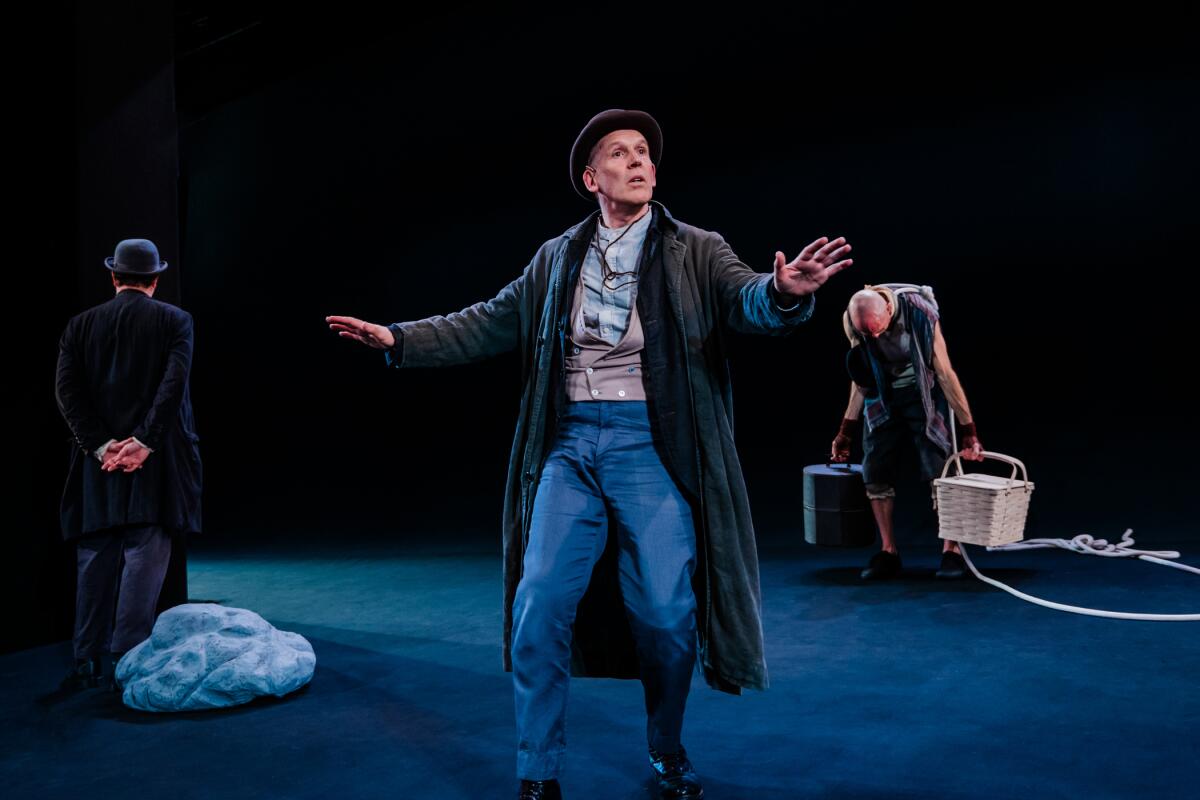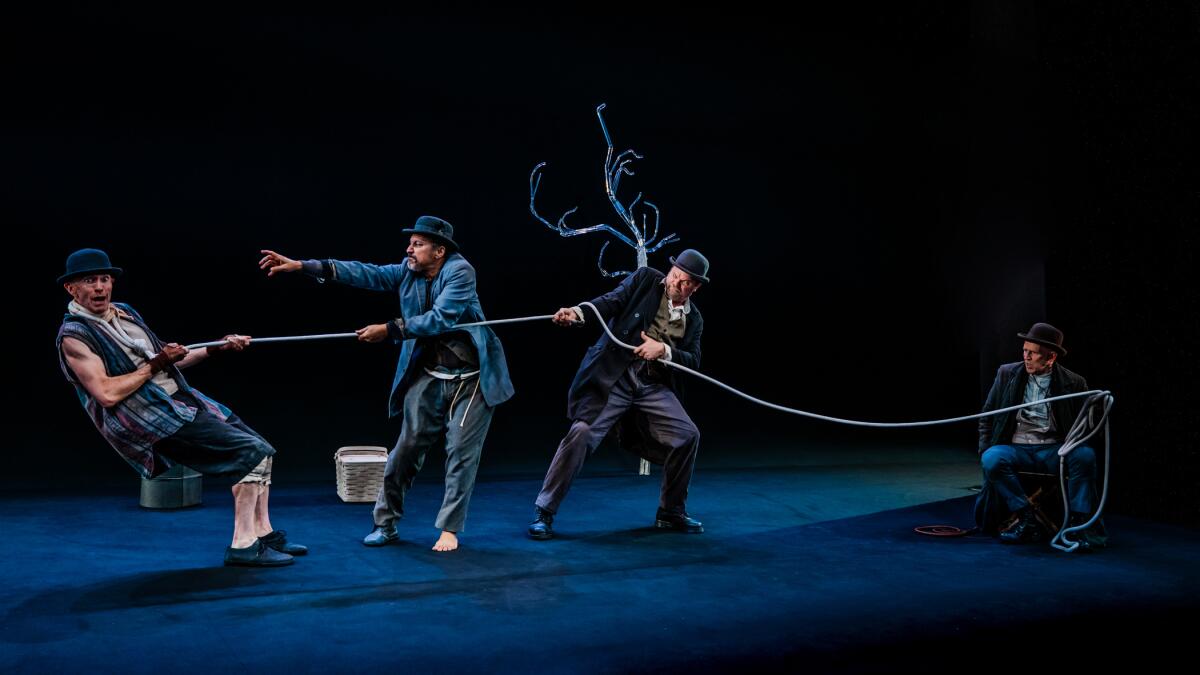Review: Rainn Wilson and Aasif Mandvi lead a ‘Godot’ that’s well worth the wait

- Share via
What’s most surprising about the excellent Geffen Playhouse production of Samuel Beckett’s “Waiting for Godot,” starring Rainn Wilson (“The Office” and Aasif Mandvi (“The Daily Show,” “This Way Up”), is how subdued the clowning is from two actors known for their offbeat comic talents.
The revival, which opened at the Geffen Playhouse’s Gil Cates Theatre on Thursday, is directed by Judy Hegarty Lovett from Gare St. Lazare Ireland, a theater company that specializes in staging Beckett’s works. Her approach to “Godot” doesn’t suppress the comedy, but it doesn’t nervously chase after laughs either, as some productions are tempted to do out of fear of losing impatient theatergoers.
Slapstick, for Beckett, who greatly admired Buster Keaton, wasn’t just good fun but a metaphor for our stumbling lives. There are verbal routines in “Godot” that Abbott and Costello would have been right at home parroting and physical comedy sequences that Laurel and Hardy would have gladly taken a tumble for.

Bert Lahr, the cowardly Lion from “The Wizard of Oz,” starred in the 1956 American premiere of “Waiting for Godot” directed by Alan Schneider at Coconut Grove Playhouse, of all places. Geffen Playhouse artistic director Tarell Alvin McCraney, who grew up in the shadow of this Miami theater, has long had a special place in his affections for “Waiting for Godot” — one of the reasons he wanted to revisit the classic so early in his tenure.
The original Florida production turned into a fiasco. But when the play had its Broadway premiere later that same year, Lahr triumphed. Critic Kenneth Tynan reported, “And when the curtain fell, the house stood up to cheer a man who had never before appeared in a legitimate play, a mighty and blessed clown whose grateful bewilderment was reflected in the tears that speckled his cheeks, a burlesque comic of crumpled mien and baggy eyes, with a nose stuck like a gherkin into a face as ageless at the Commedia dell’arte.”

“Without [Lahr],” Tynan concluded, “the Broadway production of Mr. Beckett’s play would be admirable; with him, it is transfigured.”
Directed in New York by Herbert Berghof, Lahr had been convinced to tone down his signature antics. James Knowlson, Beckett’s irreplaceable biographer, attributes the success in part to Berghof’s “determination not to intellectualize the play (at least not with the actors) and his acceptance of comedy as an important though not overriding element....”
Finding the right balance between humor and existential dread is perhaps the biggest challenge of staging “Godot.” Sean Mathias’ 2013 Broadway production of “Waiting for Godot,” starring Ian McKellen and Patrick Stewart, swung so far in the direction of tragedy that it was as if the play were being intoned from deep inside an abyss.

Wilson and Mandvi root their performances in the relationship of their characters. Rarely if ever does one get the sense that they’re engaging in shtick to get a rise out of theatergoers. Their main audience is each other. They understand that their characters desperately want to be seen, acknowledged and, most of all, compassionately witnessed.
Vladimir (Wilson) is especially anxious for confirmation that he really exists, that this reality he’s wandering through isn’t just some terrible dream. For that reason, he can’t tolerate whenever Estragon (Mandvi) wants to recount one of his nightmares.
“This one is enough for you?” Estragon asks, hurt at having been once again denied the chance to share some of his private torment.
Didi and Gogo, as Vladimir and Estragon are affectionately known to each other, are like brothers who have depended on each other for their very survival, no matter that they drive each other completely crazy. Mandvi’s Gogo behaves like the younger and more needy sibling. He asks for help in taking off his boots and wishes that Didi would extend him some sympathy for his physical pains. When he speaks, there’s often a hint of a whine.

Wilson’s more thunderous Didi isn’t indifferent to Gogo’s pleas. But he realizes that he can only do so much to soften the blows of this hard world. He’s like an older sibling who’s afraid that his kid brother is becoming too soft. Hurt by this tough love, Gogo routinely suggests that they go their separate ways, but how could either go on without the other?
This is perhaps the first time I’ve seen the play that I’ve had the sense that Vladimir and Estragon have spent possibly a half-century together, sleeping in ditches and keeping hunger at bay with rotting root vegetables.
The production makes real their complicated friendship without sacrificing the aesthetic nature of Beckett’s universe. The stage has the stark beauty of a sculpted scene by Alberto Giacometti. Even the tree that marks the spot where they’re supposed to meet the elusive Godot is like something out of an art installation.
Kaye Voyce’s scenic design and costumes, Simon Bennison’s lighting and Mel Mercier’s subtle sound design create a mise-en-scène that gives time itself a material presence. The color palette, moving from dark to light and back again, charts a precise course into lyrical bleakness.

Conor Lovett — who co-founded Gare St. Lazare Ireland with his wife, Hegarty Lovett — plays Pozzo, the bullying master who arrives with a crack of his whip directed at his slave, Lucky (Adam Stein). Trimmer than more traditional portrayals of Pozzo (John Goodman was ferociously good in the otherwise disappointing 2009 Broadway revival), Lovett gives us a different image of this capitalist authoritarian. But he makes up for in vehemence what he lacks in girth.
More importantly, Lovett lends majestic voice to the rhythms of Beckett’s play, originally written in French but conceived by an Irish imagination and translated by Beckett himself. Stein’s Lucky, carting Pozzo’s luxuries like a beast of burden, matches Lovett with a physical eloquence. When he eventually explodes into thinking, delivering a monologue of disordered intellectual half-thoughts and rhetorical tics, the stage convulses in Lewis Carroll absurdity.
Pozzo and Lucky return in Act II in a more decrepit state. Time passes with destructive fury, even if clocks and calendars are of no use to anybody. The cruelty of Pozzo’s treatment of Lucky makes an impression on Didi, who starts calling Gogo “hog” in imitation of Pozzo’s example. It’s a sly note of social observation from Beckett on how inhumanity is transmitted in a play that is focused on our mutual dependence in a world without metaphysical foundation or solace.

There are no saviors in Beckett’s cosmos. Godot once again postpones his appointment, as a boy (Jack McSherry at the reviewed performance) comes at the end of the first and second acts to report. The play, like our lives, is circular, the beginning foreshadowing the inevitable end.
The production doesn’t shy away from such somber notes. Hegarty Lovett lets silence reign, holding moments when something painful has been flippantly acknowledged and sometimes italicizing a line that sums up the heart of Beckett’s uncompromising worldview.
“Habit is a great deadener,” Didi tells us at the end of the play. But the greatest killer of productions of “Waiting for Godot” is self-consciousness. Fortunately, Wilson and Mandvi are adept enough comics not to fall into that trap even as they avoid the equally damaging peril of too much audience-pandering horseplay.
The Geffen Playhouse and Gare St. Lazare Ireland have delivered to Los Angeles a poised interpretation of Beckett’s inexhaustible classic.
'Waiting for Godot'
Where: Geffen Playhouse, 10886 Le Conte Ave., Westwood
When: 8 p.m. Wednesday-Friday, 3 and 8 p.m. Saturday, 2 and 7 p.m. Sunday; ends Dec. 15
Tickets: $49-$159
Information: (310) 208- 2028 or geffenplayhouse.org
Running time: 2 hours, 30 minutes (one intermission)
More to Read
The biggest entertainment stories
Get our big stories about Hollywood, film, television, music, arts, culture and more right in your inbox as soon as they publish.
You may occasionally receive promotional content from the Los Angeles Times.











